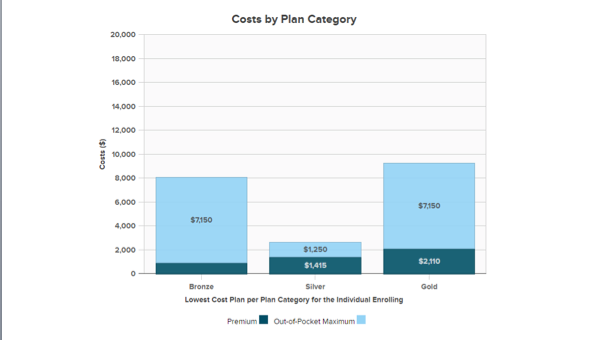Affordability
-
Senate Bill is Not Nice to Children and Families
There is a tremendous amount to digest here, and we are still working through the complex text, but one thing is clear – the Senate bill (like the House bill) will start moving the country backwards with respect to child and family coverage. Readers of Say Ahhh! know that the number of uninsured children is…
-
The Affordability Equation: The Conversation about ACA Subsidies Must Consider Premiums and Cost Sharing at the Same Time
By Hilary Dockray, Social Interest Solutions As the debate about the Affordable Care Act (ACA) continues – Repeal? Replace? Repair? – it is important to remember that the ACA was designed to work as a whole and that disassembling pieces of it would be unwise. But the national conversation continues to deal separately with two…
-
Uncertain Future for the Affordable Care Act Leads Insurers to Rethink Participation, Prices
By Sabrina Corlette, Kevin Lucia, Justin Giovannelli and Dania Palanker, originally posted on CHIRblog The Affordable Care Act (ACA) is facing an uncertain future, with a new President and Congress committed to its repeal. Upcoming policy debates could have a dramatic impact on the individual health insurance market, especially the ACA’s marketplaces. While millions of…
-
Prior to the ACA, Where You Lived Determined How Accessible and Affordable Coverage Would Be
By Sandy Ahn, originally posted on CHIRblog Before the Affordable Care Act (ACA), what state you lived in determined how easily you could purchase a health plan, the price, and what the plan would cover in the individual market. Rules varied by state, but one common fact was that insurers could use your health status…
-
The Return on Investment of Medicaid Expansion: Supporting Work and Health in Rural Ohio
By Loren Anthes, MBA, Fellow, Center for Medicaid Policy, originally posted by the Center for Community Solutions When debating the Medicaid expansion in 2013, the Ohio legislature appropriately questioned whether expanding the program to non-disabled adults would be done so efficiently, supporting the health, welfare, and economy of Ohio and its citizens. The subsequent policy process reflected…
-
For Mental Health Services, Would ACA Repeal Turn ‘Warm Handoff’ into Cold Shoulder?
One of the few points of bipartisan agreement in Congress last year was finding ways to support mental health services. The 21st Century Cures Act passed in Congress and signed by the President just last month took steps to integrate mental health into primary care services, expand the pool of providers and improve the interactions…
-
Loss of Cost-Sharing Reductions in ACA Marketplace: Impact on Consumers and Insurer Participation
While there has been considerable discussion of the new Congress’s plans to repeal and replace the Affordable Care Act (ACA), there is another, potentially more immediate, threat to millions of Americans that could materialize without legislative action. Under the ACA, insurers must reduce the cost-sharing obligations of low-income enrollees, such as their copayments and deductibles.…
-
Medicaid Coverage Improves Financial Security
Health insurance serves many purposes, but perhaps the most important function is to protect families from financial devastation. The CDC released a new report examining the percent of families having problems paying medical bills between 2011 and the first half of 2016. Overall, the percent of individuals under age 65 in families that were having…
-
Kentucky’s Proposed Waiver Could Undermine its Successful Medicaid Expansion
By Sean Miskell and Adam Searing Kentucky has released a new Medicaid waiver request for state public comment today. This proposal would allow the state to make significant changes to its existing Medicaid program, affecting not only those newly eligible beneficiaries currently receiving health care through Kentucky’s existing Medicaid expansion, but also others served by…
-
Embracing an Opportunity to Measure Value in Children’s Health Care
By Suzanne Brundage, originally posted on www.uhfnyc.org Most people in the child health community—and almost assuredly all readers of “Say Ahhh!”—are aware of the ways in which children’s health and their use of health care services differ from those of the adult population. Key differences include the prominence of prevention efforts in children’s health, the relatively…
-
Beyond the Reduction in Uncompensated Care: Medicaid Expansion Is Having a Positive Impact on Safety Net Hospitals and Clinics
More than two years after the onset of expanded Medicaid coverage, significant differences are emerging between states that opted to expand Medicaid and those that did not. This report contains the findings of telephone interviews with eleven leaders of hospital systems and federally qualified health centers (FQHCs) in seven states. Three of the states where we conducted interviews…
-
Recent Changes to the Free Care Rule Put Federal Funds Back on the Table
The so-called “Free Care Rule” prevented states from receiving federal Medicaid funds to provide any service that is ordinarily provided for free to the community at large, even if Medicaid would cover these services for its beneficiaries. For instance, if a public school nurse were to examine a student, federal funds could not be used…
-
New Study Shows Medicaid Expansion Reduces Household Debt
Medicaid expansion has led to declines in the rate of uninsurance, improved access to care for enrollees, and financial savings for states. A new study points to an additional benefit to newly eligible Medicaid enrollees: lowering debt. Prior studies indicate that Medicaid reduces medical debt, but a new study examined the impact of Medicaid expansion…
-
CHIR Expert Testifies Before U.S. House Education & Workforce Committee about Innovations in Health Care
By Georgetown University Center on Health Insurance Reforms Sabrina Corlette of the Georgetown University Center on Health Insurance Reforms joined a panel of witnesses before the Subcommittee on Health, Education, Labor and Pensions of the Education & Workforce Committee to discuss “Innovations in Health Care: Exploring Free-Market Solutions for a Healthy Workforce.” Other panelists at…
-
HHS Study Shows Benefits of Shopping and Subsidies, but Costs Still a Concern
By Sean Miskell As insurers selling on the Affordable Care Act’s (ACA) Marketplaces begin to file their 2017 rates with the Department of Health and Human Services (HHS), concerns over proposed increases will once again emerge. But a report released by the HHS Assistant Secretary for Planning and Evaluation (ASPE) demonstrates that behind the headlines…
-
Post ACA, 3 Communities Respond to a Shifting Health Care Landscape for Newly Insured
The Affordable Care Act (ACA) has proven successful in meeting one of the law’s primary goals: to extend coverage to more Americans. Nearly 13 million people signed up for marketplace coverage in the 3rd open enrollment period, contributing to a dramatic reduction in the number of uninsured. But what has that coverage meant for helping…
-
President Obama’s Budget Takes State-Level Debates over Surprise Out-of-Network Bills to National Policymakers
by Sandy Ahn, Jack Hoadley and Sabrina Corlette of the Center on Health Insurance Reforms, originally posted on Health Affairs Blog, March 22, 2016 President Obama’s final budget proposal was met with little fanfare, but a lot of political opposition. The President, however, put forth one legislative proposal that deserves attention. It is aimed at helping…
-
FAQ: Health Marketplace Tax Penalties, Exemptions, Reconciliation, and Special Enrollment Periods
By Tricia Brooks, Sandy Ahn, Sabrina Corlette, and JoAnn Volk, this was originally posted March 9, 2015 under the title “Confused about What Happens at Tax Time? FAQs on Penalties, Exemptions, Reconciliation, and SEPs“. As part of our Robert Wood Johnson Foundation funded work in providing technical assistance to consumer assisters in five states, we…
-
States Innovation Waivers under the ACA: A Closer Look at the Updated Federal Guidance and State Proposals
By Kevin Lucia, Justin Giovannelli, Sean Miskell and Ashley Williams. Originally posted on the CHIRblog. The Affordable Care Act (ACA) established a framework—including now-familiar elements like insurance marketplaces and premium tax credits—to expand access to affordable, comprehensive health insurance coverage. However, the law also gives states a chance to realize these goals using alternative solutions.…
-
2016 Federal Poverty Levels Are Out; What Does This Mean for the Marketplace and Medicaid?
Last week, the 2016 federal poverty levels (FPL) were published in the federal register. How does this impact consumers applying for coverage through the Marketplace, Medicaid or CHIP? Let’s start with eligibility for Marketplace subsidies. For 2016 calendar year coverage, regardless of when someone applies or enrolls, eligibility is based on the 2015 FPL levels.…








